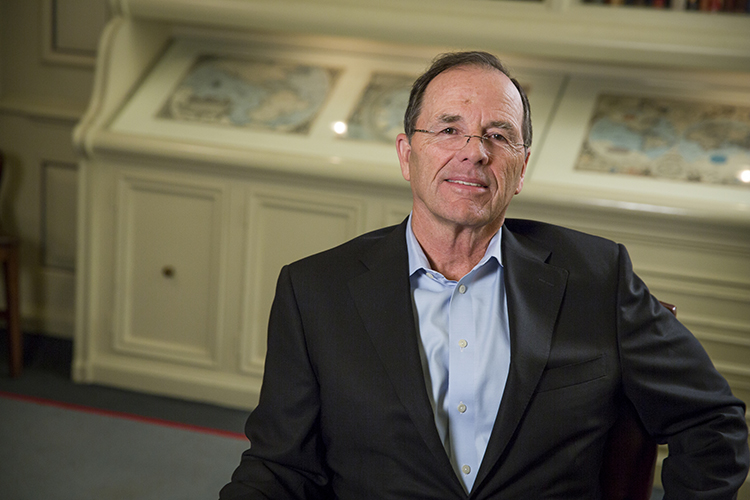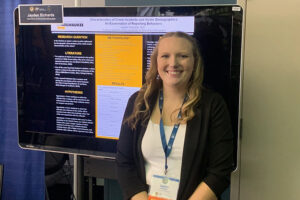In 2005, when Steve Burd directed one of the nation’s largest supermarket chains, he faced a wicked problem. Safeway had 185,000 employees, along with many of their families, on the company’s health insurance ledger, and annual health care costs hit $1 billion. Moreover, the chain’s bill was still growing at $100 million a year.
Burd, an economist, serial entrepreneur and UW-Milwaukee alumnus, first turned to research. As he began to untangle the complex structure of the health care industry – the largest single sector in the United States economy – he found that information on cost and quality of services was not “where you could see it.” Incentives, like the “good driver” rates offered by automobile insurance, were also missing.
So 11 years ago, he led an overhaul of Safeway’s health insurance plan, and thereby helped ignite a national discussion on health care reform. Burd shared that story and more as the keynote speaker at UWM’s 2016 Leadership Healthcare Forum, held Tuesday at the Italian Community Center.
The advocacy of Burd, a staunch Republican, even added a bipartisan twist to President Barack Obama’s Affordable Care Act, which went into effect in 2010.
“We discovered, among other things, that [health care] didn’t function like the rest of the markets in our economy,” Burd said. “If you can bring market forces to bear, I believe you can lower the health care costs in this country by 50 percent. That’s important, because 50 percent are paid for by our taxes. It’s called Medicaid and Medicare.”
Now retired from Safeway, he started Burd Health to find health care solutions for other large employers with an eye toward improving the health of their workers while saving everyone money.
Midwestern roots
Burd moved to the Milwaukee area as a child and attended Pewaukee High School. Because his mother worked at Carroll College (now Carroll University), Burd earned his bachelor’s degree there tuition-free.
He then enrolled at UWM, where he earned a master’s degree in economics in 1973. Like many UWM students then and now, Burd paid for his graduate education himself, so proximity was a plus. He still draws on his UWM experience and still remains friends with Eric Schenker, who was his adviser back then and is now a professor emeritus.
“I think the work ethic in the Midwest is special,” Burd says, “and I feel very fortunate to have gone to UWM, which reinforced that.”
After graduation, he moved to the West Coast and started his career at Southern Pacific, a miniconglomerate best known today for starting telecommunication company Sprint. By 1992, he was Safeway’s CEO.
Mr. Burd goes to Washington
Things took a turn for Burd in 2000, when he was diagnosed with prostate cancer. He was referred to a physician at the University of California-San Francisco, and he learned another lesson that fueled his passion for health care.
“At the time, if you had prostate cancer surgery, there was a 50 percent chance that you would be incontinent afterward,” Burd said. “And [my doctor’s] track record was two-tenths of 1 percent.”
Knowing such information about his doctor was clearly beneficial, but discovering useful information about medical professionals is also extremely difficult.
“You can find a 22-fold difference between the cost of services from one doctor and another, and they may share the same parking lot,” Burd said. “Consumers don’t know that.”
His cancer experience, combined with his Safeway wellness programs, put him in the center of the nation’s health care conversations. And like many high-profile business executives, Burd was invited to the White House. He used the opportunity to present his views on health care models, and also appeared before the entire U.S. Senate, speaking to each caucus separately.
“The president actually liked what we were doing,” Burd recalls. “I also became friends with a number of people in the House and Senate, including (Wisconsin U.S. Rep.) Paul Ryan. And Paul’s an economist, by the way, so he and I hit it off.”
The relationships gave him a chance to have a direct impact on public policy.
Burd and two senators, a Republican and a Democrat, chiseled out the only amendment to the Affordable Care Act that passed. Called the “Safeway Amendment,” it expanded the scope of employer-based wellness incentives.
“It was a bit unusual walking the halls of Congress, because I was someone who was not there asking for something for himself personally, not asking for something for his company,” Burd said.
“I was just there to make sure they got it right.”








